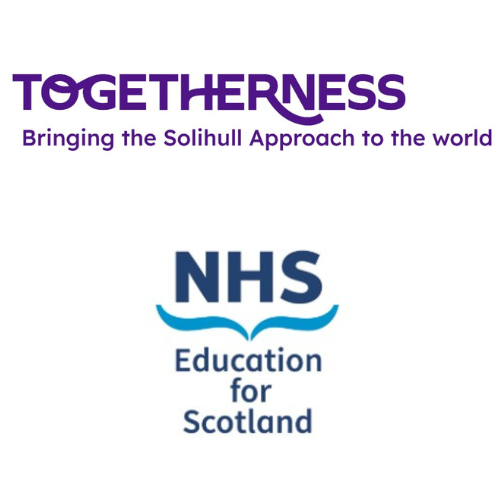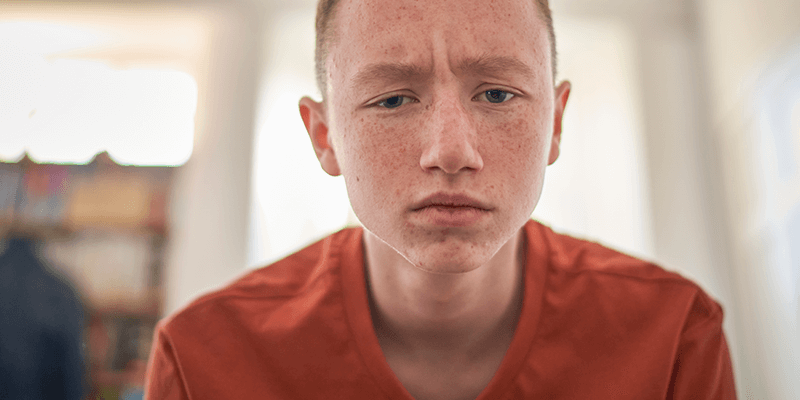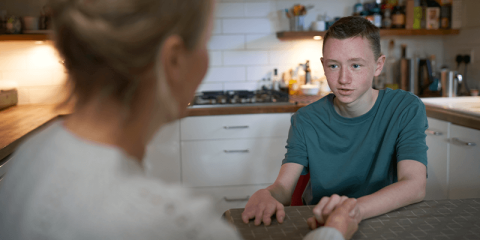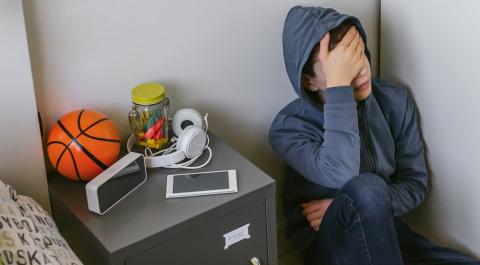Raising a teen is a tricky business. But you don’t have to do it alone. Seeing your child struggling can be upsetting, even scary. But there are lots of organisations and services to help parents of teenagers, as well as teens themselves.
Help from your teen’s school and your GP
Speak to your teen’s school if you have concerns or are looking for support. The school will be happy to help. If you have worries about their health and wellbeing, it’s important to let the school know as early as possible. This lets them work with you to put support in place.
Your GP will also be able to offer help and support.
Help from your child’s school or your GP could include:
- support from a school counsellor
- resources your teen could use to manage their mental health
- referring them to community-based services that can help them – you can find out more about these services in your area on the NHS Scotland website here
- referring them to Child and Adolescent Mental Health Services (CAMHS) – our page on getting support from CAMHS has more information about this.
In an emergency
If your child is in immediate danger, call 999 straightaway.
If you have urgent concerns and are worried your child could come to harm you can:
- Contact NHS24 (111) and ask to speak to a Mental Health Advisor
- Contact Childline (0800 11 11) or Samaritans (08457 90 90 90)
Looking after yourself
Being the parent of a teenager can be hard work! To be there for them, you need to be in a good place yourself. We have some tips on looking after your mental health and ways to help you cope and relax. It’s not selfish to look after yourself. And the happier you are the better support you can be for your teen.
Support for parents of teens
Looking after a teen can be tough. Talking to someone else about the situation can be a big help – this could be a friend or family member, a parent in a similar position or someone at a support line. Here are some places that can help:
- Children First's support line provides free advice and support on all aspects of parenting.
- YoungMinds have a friendly, confidential parents' helpline and webchat service offering information, advice and signposting.
- Breathing Space is a confidential phoneline for anyone in Scotland over the age of 16, feeling low, anxious or depressed.
- Parenting Mental Health has an online forum which provides a safe, non-judgemental space to share the experience of parenting a child with a mental health issue.
- If your teen is struggling with their sleep, the Sleep Action supportline offers advice and support for you and your child. Sleep Action more information on teen sleep here that may be helpful.
- If you have twins, triplets or more, the Twins Trust offers support and advice, including a helpline, online communities and courses.
- You can find more website and helplines supporting parents’ mental health on the Connect website.
Learn more about teen mental health
If you’re feeling overwhelmed or powerless, one of the things that may help is to learn more about what’s going on for your teen. The following resources may help you understand more about teen mental health and how you can support them.
- The Scottish Centre for Conflict Resolution has great resources to help parents understand what’s going on in teens’ brains.
- MindEd has advice and information to help you to understand your teen’s mental health, what you can do to best support your family, and how to take care of yourself.
- HappyMaps has mental health resources for parents and carers, and for young people and children, all in one place.
- The Anna Freud Centre also offers resources to help parents support their teen’s mental health.
- NHS Scotland and SilverCloud are offering free courses to help you boost your wellbeing and mental health, and support your children too. There are programs on sleep, stress, resilience, body image and money worries, as well as programs to help you support an anxious child or teen. You can find out more about the courses available here and sign up for free using the code Scotland2020.

If you'd like to understand more about what this stage of development means for your teenager you can access Togetherness Online Learning Pathways, where you will find Understanding Your Teenager’s Brain. This takes parents on a learning journey for understanding adolescent development, behaviour and wellbeing, to help build stronger connected relationships and resilience for the everyday. There are even courses for parents if you are keen to think about relationships and experiences that may have influenced you across your own life. You can find out more at Togetherness and access the courses for free using the code TARTAN.
Further support for teens
One of the best ways you can support your teen is to let them know that you are always there if they need to talk. You could also suggest they talk to another trusted adult, like an aunt or uncle or teacher. If they’d rather not to talk to you or anyone else they know, there are lots of helplines offering free, confidential advice and support.
Helplines to contact
- Teens can phone Childline for free confidential advice and support.
- Shout provides free, 24/7 text support for young people across the UK experiencing a mental health crisis.
- The Mix offers support to young people by phone, email and webchat.
- The Breathing Space helpline is available to help teenagers aged 16 or over who may be experiencing low moods and depression.
Useful resources
Your teen may also find that understanding more about mental health and self-care may help. Here are some resources they could look at.
- Young Scot's Aye Feel hub has lots of information for young people on how to look after their emotional wellbeing, including ideas from other teens, as well as support from organisations around Scotland and tips on how to promote a positive mindset.
- SAMH has useful resources to help young people with how they're feeling.
- YoungMinds has lots of helpful advice for young people, including a self-care guide to help them manage their mental health.
- Mind Yer Time supports children and young people to help you use their screen time positively.
- If you’re having arguments at home, the Scottish Centre for Conflict Resolution has resources to help young people.
- Togetherness online learning pathways have a pathway specially designed for teenagers, to help them understand themselves, their emotions, and how their brain changes in adolescence. You can find out more at Togetherness and access the courses for free using the code TARTAN.
Help and support if your child is disabled
If your teen is disabled, there may be additional pressures as they become more independent. But there are lots of organisations offering help and support.
- Disability Information Scotland provides reliable, accurate and accessible information for people living with disability in Scotland through their helpline and website.
- Contact offers advice and information for families with disabled children.
- Mencap offers advice and support for people with learning disabilities and their families and carers. They have a helpline and an online forum where you can ask questions about learning disability, share experiences and offer support.
- Scottish Autism provides information, advice, and a range of support services across Scotland for autistic individuals and their families.
- Our page on talking to your child about neurodiversity has information on how to spot the signs that your child’s brain may work in a different way and how you can talk to them about this and get any support they may need to help them flourish.
- Children have a legal right to get additional support at school if it’s needed. Enquire has information about additional support needs and confidential advice on your rights and entitlements.
- The Family Fund website has lots of information for families and carers of disabled children, including where to get further support. They also offer grants for eligible families.
- To find out more information or to access support for your child’s rights in relation to health, Children’s Heath Scotland offers advice and help.
- If you’re caring for a disabled child you can get support from Carers Scotland. You can also get support at your local Carers Centre. If you have other children who help look after your disabled child, they can also get support as young carers. Young Carers can find out more about the support available to them on the Young Scot website.
You can find further links to support in our Family Support Directory.
 Activities & Play
Activities & Play Behaviour
Behaviour Childcare
Childcare Development & Growing Up
Development & Growing Up Family, Friends & Relationships
Family, Friends & Relationships Feeding Your Baby
Feeding Your Baby Food & Eating
Food & Eating Health & Safety
Health & Safety Mental Health & Wellbeing
Mental Health & Wellbeing Money & Work
Money & Work Online Behaviour & Safety
Online Behaviour & Safety Pregnancy & First Days
Pregnancy & First Days School & Education
School & Education Sleep
Sleep












 Behaviour
Behaviour
 Family, Friends & Relationships
Family, Friends & Relationships